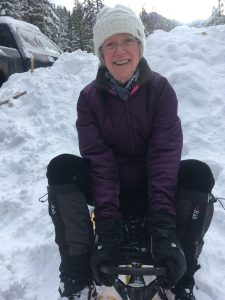
North Vancouver, British Columbia
My journey began in 2012, when my esthetician found a black spot on my heel during a pedicure and insisted that I see an MD. I could not see the spot without contortions and when I did look at it, using a mirror, it just looked like a dark rough area of skin on the edge of my heel. It was Christmas, and with all of the busy-ness I delayed seeing a doctor until 2013 when the spot bled. I was diagnosed with a BRAF positive pT4a melanoma on my right heel that had spread to one lymph node in my groin.
I was devastated, frightened, and resigned to an early death. My oncologist told me I would likely succumb to the disease within 5 years. My treatment plan involved excision of the lesion and surrounding tissue, removal of the superficial lymph nodes in my groin and “wait and see”. I did not meet the criteria for any of the drug trials available at the time.
After my initial diagnosis and treatment, my original oncologist, who was a melanoma specialist, retired, and I was moved to another BCCA oncologist whose specialty was hematology. I was followed every 3 months by him for 2 years but did not feel comfortable with the depth of his assessment. In 2015, after my own research, I requested to be moved to a female oncologist at BCCA whose specialty was melanoma. I feel this move saved my life. As a part of my original appointment the new MD did a CT scan and PET scan which revealed my melanoma had metastasized to the lymph nodes in my pelvis and around both kidneys as well as into the bone of my humerus. I was crushed and terrified. My daughter had just announced the arrival of my first grandchild; I wasn’t finished living.
At the time of my original diagnosis in 2013, the immunotherapy medications now available were in the experimental testing stage. However, in 2015 they were being made available by the drug companies for final testing. After discussions of treatment options, my oncologist contacted a company and requested that I be put on Pembrolizumab (Keytruda) on a compassionate basis. Over the next 2 ½ years I received 42 doses of the drug free of charge as a part of the company’s clinical trials. At that time Keytruda was only available in the US at the cost of approximately `$100,000/year. Within a year of taking the drug, the lesions on my kidneys and bone shrunk and disappeared. However, after the initial shrinking, the one in my groin began to grow again. The decision was made to surgically remove the groin lesion in 2017. I did have minor side effects from the drug, such as vitiligo (loss of pigmentation in patches on my skin, eyelashes, and eyebrows), skin lesions, and flare-ups of my arthritis during this period. Eventually, development of swallowing difficulty for both liquids and solids (dysphagia) required I stop taking the drug. The oncologist was concerned it may also be a drug side effect, as one of the causes of dysphagia is autoimmune disease. I had lost 25lb as I was unable to eat. At that point I was told I was in remission – now referred to as no evidence of disease (NED). Throughout this period, I was supported by my loving family, cherished friends, and a counsellor trained in dealing with cancer patients.
Since 2019, when I stopped taking the drug, I have been followed regularly with CT scans and blood work and have remained NED. My grandson is 6 now and I have cherished every day.
To someone who is facing a new melanoma diagnosis I would say: 1. There is always hope. Treatment options are expanding every year resulting in successful cancer management and life extension. 2. Do your research to understand the disease and current modes of treatment using trusted internet sites. 3. Take advantage of groups such as SYS to provide support and information. 4. Be your own advocate and express concerns if you are not comfortable with your treatment plan. 5. Seek help to deal with the overwhelming emotional toll this disease brings to you and your family.
It has been 10 years since my initial diagnosis. I am still here. Yes, I continue to struggle with dysphagia, but it is being managed. I have watched my grandson grow, hugged and visited my family often, learned how to make pottery, and appreciated the simplicity and joy of day-to-day life. There is always hope.
Request to connect


